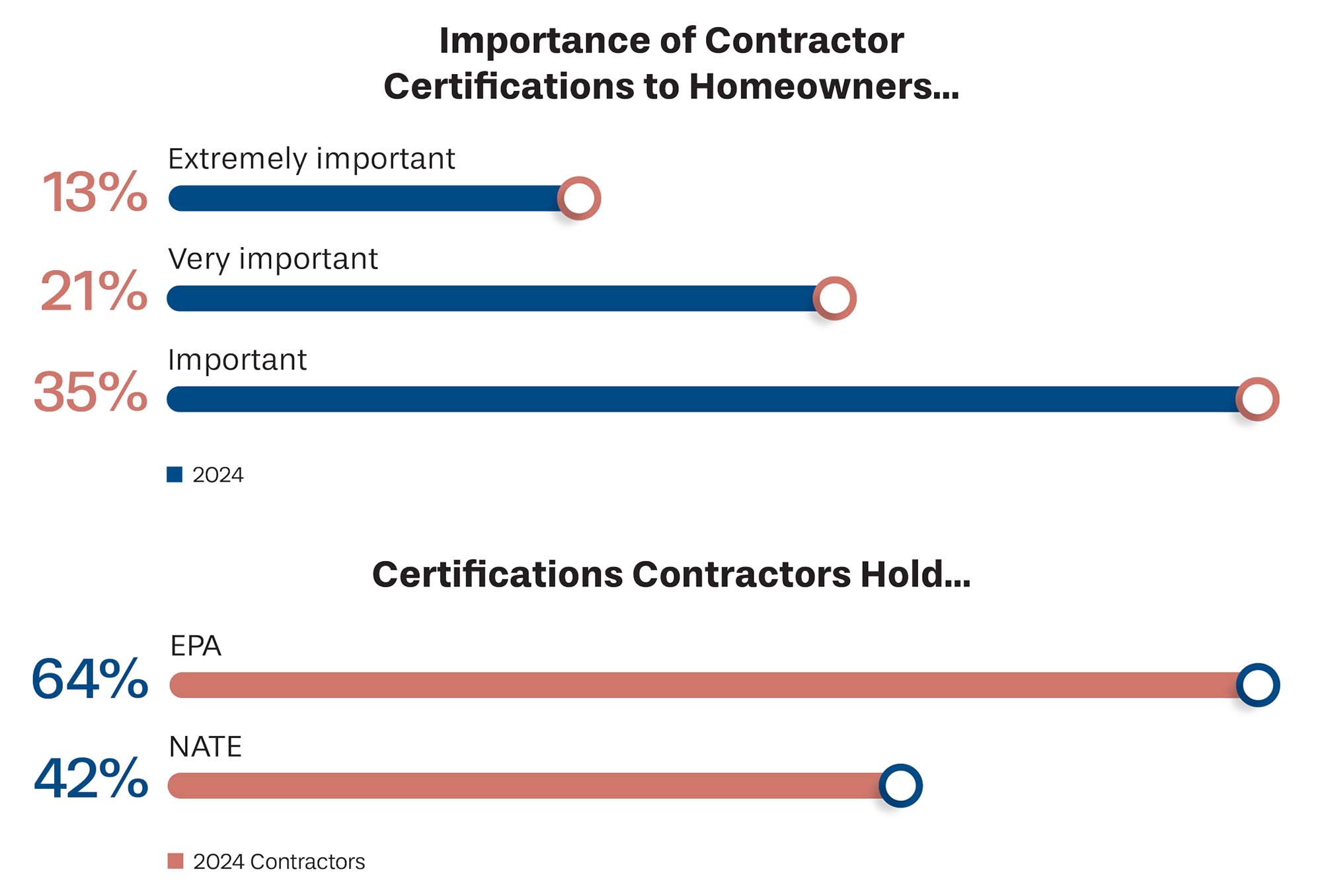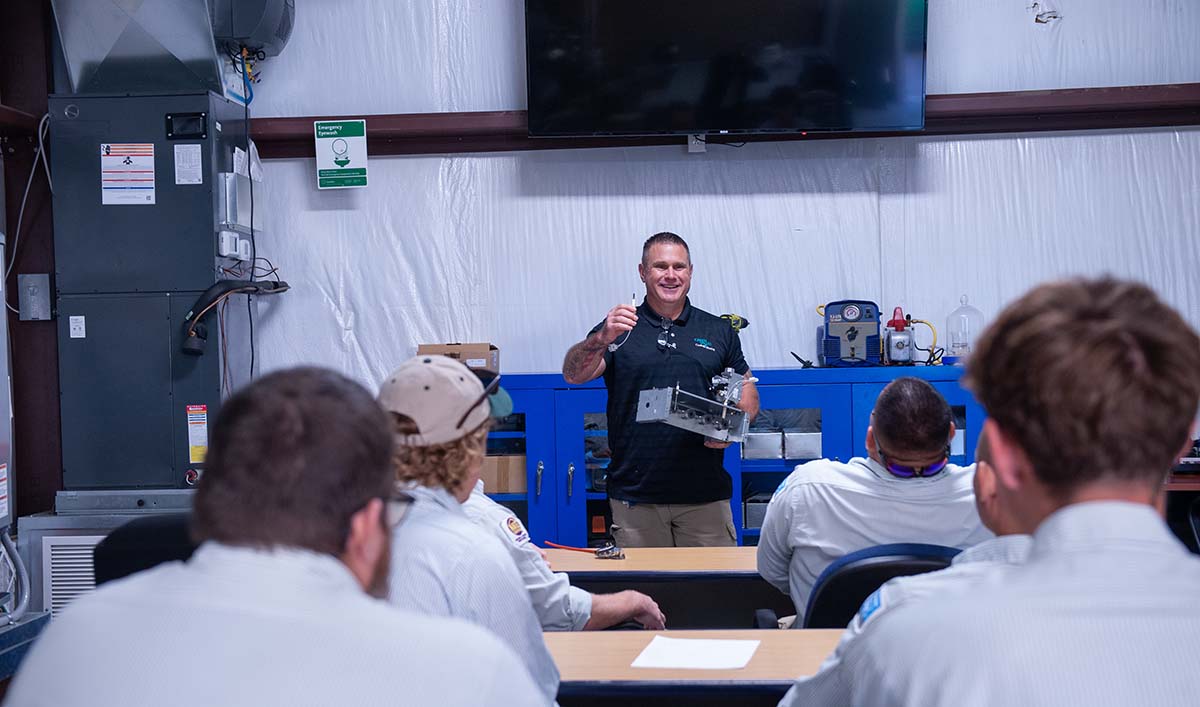✕
A recent survey conducted by myCLEARopinion on behalf of The ACHR NEWS found that homeowners do place some importance on whether or not the contractors and technicians that service their homes hold certifications such as NATE or Environmental Protection Agency (EPA). To be exact, only 13% of homeowners surveyed answered that aside from an HVAC contractor being licensed and insured, it’s “extremely important” to them that their contractors hold certifications such at NATE or EPA — which, according to the same data, are the most common certifications amongst the surveyed contractors. Twenty-one percent of homeowners answered this was “very important,” and 35% of homeowners answered it was just “important.”

SURVEY SAYS: A recent survey showed that contractors place more importance than homeowners on technician certification. (Courtesy of myCLEARopinion)
Additional data found included what percentage of HVAC technicians hold some type of certification: 64%.
But it doesn’t really matter how important homeowners think these certifications are, because the HVACR industry knows their true value. And whether or not homeowners pay certifications much mind (and for the record, their indifference is likely due to a lack of education around how certification benefits them), the majority of contractors are always working to ensure that their workers hold the certifications needed to stay up-to-date on industry trends, build their confidence, and show homeowners their work can be trusted.
Why Don’t Homeowners Care?
It’s hard to believe that homeowners know why contractors are getting their techs certified, and the difference it makes in the work they do, and then still don’t find it that important. If a contractor is licensed and insured, that’s usually good enough for most homeowners. This could be chalked up to a lack of awareness, or maybe a belief that experience is more important than credentials.
Jon Lanier, president at NATE, said homeowners may assume that all technicians possess similar qualifications without understanding the added value of certification.
“Certifications like NATE demonstrate that a technician has met rigorous industry standards,” he said. “Educating homeowners about certifications’ connection to quality, efficiency, and safety could help bridge this gap and elevate the perceived importance. To support this, we provide resources to contractors employing NATE-certified technicians that they can share with homeowners, helping to highlight why their technicians stand out and the advantages they bring to each job.”
In the experience of Erik Springsteen, training coordinator at Green Valley Cooling and Heating in Green Valley, Arizona, this approach does work.
“When certifications like NATE are promoted, homeowners often request certified technicians, showing that awareness matters,” he said.
Looking for a reprint of this article?
From high-res PDFs to custom plaques, order your copy today!

TRUST: Certifications show homeowners that their technicians can be trusted. (Courtesy of Green Valley Cooling & Heating)
Jay Osburn, talent acquisition specialist at Atlas Butler Heating, Cooling & Plumbing in Columbus, Ohio, said certification is a pledge they make to their customers that they are committed to providing the best possible service, regardless of what tech enters their home.
“Maintaining certifications is a commitment in and of itself, and continuously maintaining NATE certs shows a commitment to the craft and a commitment to providing the best service for customers,” Osburn said.
Certification and Trust
What certification provides for homeowners is a certain level of trust.
“It shows that Green Valley technicians are truly dedicated to their craft and, by extension, to the customers they serve,” Springsteen said. “It reassures homeowners that their technicians are highly trained professionals who go the extra mile to demonstrate their expertise. To us, NATE certification is like a form of higher education — it’s a mark of excellence and commitment.”
When technicians are certified, it reassures the homeowner that those techs have the necessary skills and knowledge to handle their HVAC systems properly.

LACK OF AWARENESS: Once homeowners know what a certified technician can provide, they likely won’t want anything but that. (Courtesy of Green Valley Cooling and Heating)
“Certifications act as a badge of credibility, showing that the technician has gone above and beyond to meet industry standards,” said Lanier. “This trust can be the deciding factor for many homeowners when choosing a contractor.”
On the contractor side, having certified techs makes a big difference in how an HVAC business runs. Technicians can complete jobs more efficiently and are better equipped to handle advanced systems and the evolving technologies in the HVACR industry, all with fewer callbacks. This translates to higher customer satisfaction, more referrals, and increased profitability.
“Certifications ensure that our team is highly skilled, knowledgeable, and up-to-date on industry standards, which leads to better, more reliable service for customers and fewer call-backs,” Springsteen said. “It also boosts efficiency, since certified technicians are trained to handle complex systems and troubleshoot effectively.”
Jones said certification builds confidence within the technicians that they pass on to their customers.
“I think getting their certification — understanding how HVAC stuff works, and having the knowledge of the related instructions that are given to them — it gives them something to work for,” he said. “Having a certification and learning everything you can in this trade benefits you in the future.”
It can also be difficult for contractors to juggle all of their technicians and their respective skill levels, which is another place certification can come in handy.
“With so many techs on the road (40 service techs and 15 install crews), it can be tough to ensure everyone is on the same page technically; however, the NATE certification process gives us peace of mind that these technicians have the expertise needed to complete the work,” Osburn said.
According to Lanier, a research project conducted with NATE and XOi Technologies found that NATE-certified technicians perform better in the field.
The XOi research study, conducted in collaboration with NATE, evaluated the effectiveness and value of NATE-certified HVAC technicians compared to their non-certified counterparts. The study surveyed 437 technicians across 34 states and tracked their performance over a 120-day period during the summer of 2023. Here are the key findings:
-
Higher Productivity:
NATE-certified technicians consistently completed more jobs than non-certified technicians, showcasing their ability to work efficiently and handle a wide variety of tasks. -
Versatility:
Certified technicians demonstrated greater adaptability, taking on more diverse and complex assignments, which allowed businesses to maximize their operational capacity. -
Increased Profitability:
On average, NATE-certified technicians generated an estimated additional top-line revenue of $19,100 per month per technician. This boost was attributed to their higher productivity and reduced need for call-backs. -
Quality of Work:
Certification provided a structured skill set that enabled technicians to meet industry standards, resulting in fewer errors and improved customer satisfaction, Lanier said.
Certifying Techs
How contractors go about certifying their technicians varies by company.
Lee Jones, instructor at CroppMetcalfe who services parts of Virginia, Maryland, and D.C., gives a two-week class in which he uses interplay videos and study guides. CroppMetcalfe has 37 certified technicians.
“Some have the traditional path, and most have the CHP-5,” Jones said. “We also have our techs go through our boot camp and apprenticeship four-year program. My 47 years of experience also helps prepare our techs.”
Atlas offers on-site testing as well as various training throughout the year in order to prepare their technicians for various certifications.
“We have developed a roadmap for each certification offered that lays out the steps needed to be taken to obtain the certification along with helpful study materials, YouTube videos, and any other materials we can provide them,” Osburn. “We currently have 63 EPA-certified technicians and 23 technicians who have earned at least one NATE certification … I feel that NATE gives our techs the knowledge of what the terminology of HVAC is.”
Green Valley also makes sure technicians are able to set enough time aside for certification classes, while covering any costs and providing support along the way.
“As certifications are built into our career pathing, our team holds a wide range of industry.
certifications, including but not limited to BPI, NCI, NATE, and EPA,” said Springsteen. “100% of our team is EPA 608 certified, and 100% are certified through NATE on our C3. 58% of our field technicians hold their NATE Specialty, which reflects our commitment to maintaining a highly skilled and professional team.”
Leveraging Certifications
Contractors who have most or all of their techs certified can leverage this information in their marketing/communication efforts to stand out in their market. It’s a differentiator between them and other outfits. Plus, even if their competitors do have certified techs, they might not be highlighting that fact.
“Businesses can promote their certified technicians in advertising, websites, and customer interactions to highlight their commitment to quality and professionalism — including certifications in marketing materials or adding badges to uniforms and vehicles can make a strong impression,” said Lanier. “Certification can also be a talking point for educating homeowners on why choosing a certified professional matters for their home’s safety and efficiency.”

